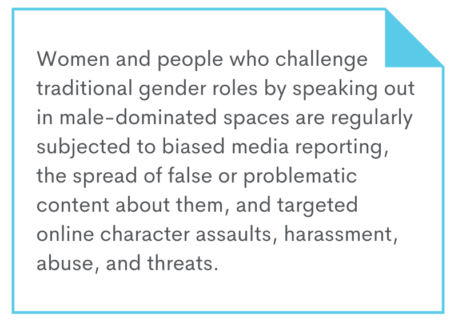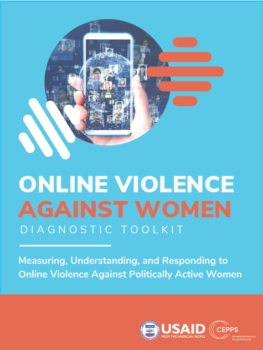
Online and technology-facilitated violence against women in elections and politics is a pervasive, global problem that impedes women’s equitable and meaningful participation in public life and their willingness to engage in public life.
Women and gender-diverse individuals who hold or seek positions of public leadership often face gendered commentary, harassment, and violence based on their real or perceived character, morality, appearance, and conformity (or lack thereof) to traditional gender roles and norms. Their representation in the public information space is often defined by sexist tropes, stereotypes, and sexualized content.
Seventy-three percent of women have been exposed to or experienced online violence, and only 26 percent of law enforcement agencies of the surveyed countries have taken action against online violence. Women and girls participating in politics and elections, in particular, often face violence and harassment simply because they are a girl or woman who is online.

Online violence against women is not typically talked about as unusual or surprising; rather, it is often considered a risk that women and girls should expect when choosing to engage in digital spaces, or, in the case of politically active women, as “the cost” of doing politics. Decisive action is needed to respond to and create accountability for online violence against women to help send a strong message that all forms of violence against women are unacceptable and bring perpetrators to justice.
Perpetrators of online violence against women and technology-facilitated gender-based violence (GBV) exacerbate existing harmful gender norms and inequalities, enforce heteronormativity, increase social intolerance, and deepen existing societal cleavages. Online violence and technology-facilitated GBV have a chilling effect on women’s political participation both online and offline, as women choose to silence themselves or disengage to protect themselves from abuse.

One of the challenges to combatting online violence against women is adequate documentation. Documenting and analyzing online violence against women is imperative to designing and implementing programs that recognize, respond to, and challenge gender inequalities and power relations and transform gender roles, norms, and stereotypes. CEPPS has developed a suite of inclusive monitoring and evaluation tools to measure and document online violence against women in politics and inform programming and interventions to prevent it, mitigate it, and to support survivors.
